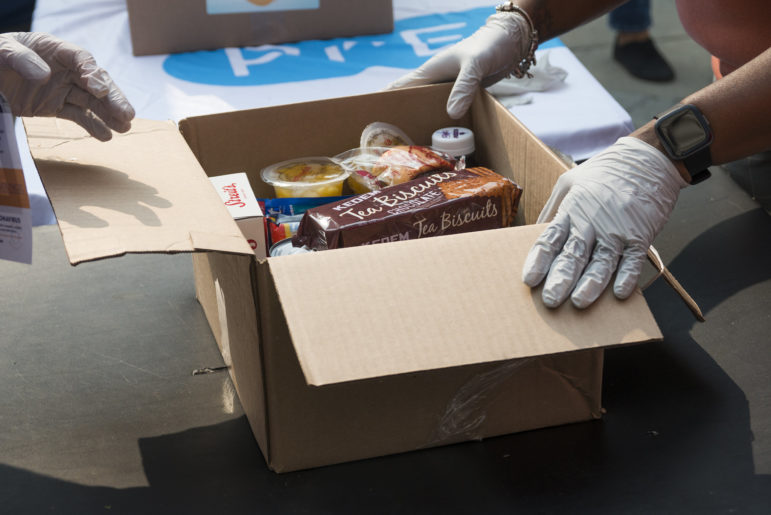‘Without a radical bump in funding, nonprofits will not be able to continue meeting the colossal demand for life-saving support like affordable housing, homecare, food pantries, home-delivered meals, rental assistance, job training, and the countless other essential services we provide to our communities.’

Flickr/New York City Council
A pantry box being prepared at a city food giveaway in September.While the coronavirus pandemic wreaked havoc on New York, it revealed a tale of two cities where historically and systemically disenfranchised New Yorkers suffered the most from the virus’ grip. COVID-19 ravaged zip codes with high concentrations of low-income residents and people of color. Aside from experiencing the highest death rates, these communities are grappling with breathtaking levels of unemployment and its accompanying consequences: homelessness, hunger, violence, and deeper poverty.
Now, as we appear on the cusp of a second surge, we risk repeating the mistakes of the recent past by not equipping vulnerable communities with the resources they need to overcome the pandemic’s effects. Demand for critical services has escalated citywide over the past eight months, but the need in our most vulnerable communities is staggering. Human service nonprofits like RiseBoro Community Partnership, the organization I lead, are essential to keeping New Yorkers in high-needs neighborhoods afloat during the ongoing public health and economic crises. Without a radical bump in funding, nonprofits will not be able to continue meeting the colossal demand for life-saving support like affordable housing, homecare, food pantries, home-delivered meals, rental assistance, job training, and the countless other essential services we provide to our communities.
Unfortunately, instead of increasing investment in nonprofits, the DeBlasio administration has done the opposite. Instead of honoring commitments made to pay nonprofits the full cost of operating their programs, the city cut funding by 40 percent. Instead of recognizing our workforce as essential and reimbursing nonprofits for hazard pay advanced to their employees, the city flip-flopped. Nonprofits have been left to foot the bill for many of the services that kept vulnerable New Yorkers healthy and safe during the pandemic’s darkest days. It is imperative that the city is held accountable for its broken promises to the nonprofit sector, and that funding is restored to ensure that more low-income residents of color do not continue to suffer disproportionately during a second surge.
 CityViews are readers’ opinions, not those of City Limits. Add your voice today!
CityViews are readers’ opinions, not those of City Limits. Add your voice today!
Funding the city’s nonprofits is not only ethically sound, it is an economic engine. The city comptroller’s office recently released a report showing nonprofits contribute $77.7 billion to New York City’s economy each year, and nonprofit employment makes up about 18 percent of all private employment in the city.
Yet human service nonprofits are confronting millions of dollars in unexpected costs and lost revenue. Fundraising events were canceled. Program suspensions caused lost income. Organizations hired a significant number of temporary employees to keep up with the increased demand for services. Others, like RiseBoro, proactively increased frontline workers’ hours and provided hazard pay.
But the city continues to undervalue our work. Incentive pay for essential nonprofit workers were not reimbursed, and nonprofits were left to foot the bill. To compound insults, the de Blasio administration slashed support for the Indirect Cost Rate initiative, which would have finally reimbursed nonprofits for the true overhead costs of running their programs. For RiseBoro, this meant a loss of nearly $400,000 in the last fiscal year alone. We have been forced to delay the development of strategic initiatives, defer the filling of key staff positions, and curtail program enhancements. Further, we are nearly six months into the new fiscal year not knowing what cuts there may be to current fiscal year funding.
These cuts are far from innocuous. Human service nonprofits are keeping high-needs neighborhoods from heading into a freefall, providing the critical services and care families need to survive. Yet the city consistently underfunds and disrespects us.
If we are to continue to meet the growing needs of our communities, if we are to continue to be the fabric of the social safety net, if we are to help reverse the disparities that have been laid bare by the pandemic, something needs to change. It’s time nonprofits are treated like the essential services they are.
Scott Short is the CEO of RiseBoro Community Partnership, a nonprofit dedicated to holistic community revitalization in New York City.








